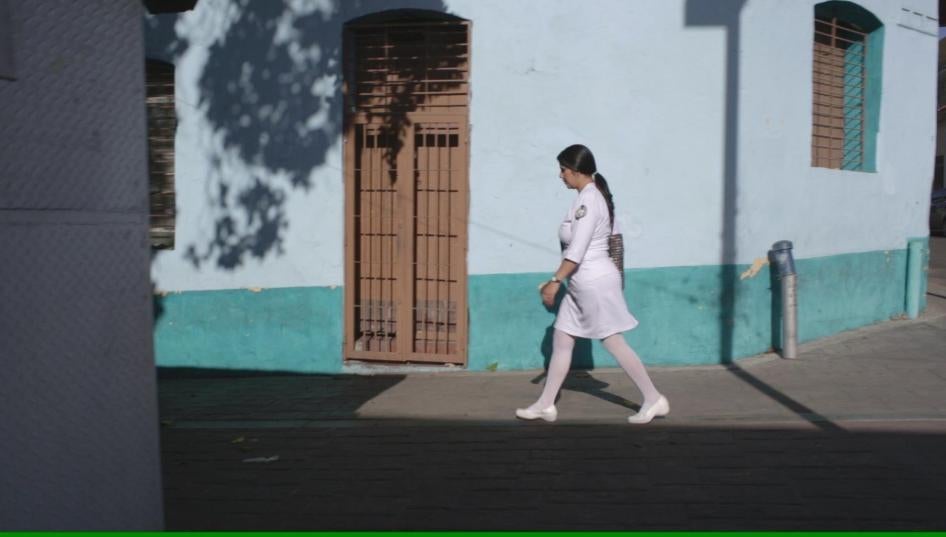Olga broke down in tears when she told me that members of Venezuela’s investigative police broke into her home, beat her and other members of her family, and forced her to watch as a security agent stormed into her 16-year-old son’s bedroom and shot him dead. Yet, with unwavering strength, she also said that she wanted justice for her son.
Olga’s story is one of five portrayed in Women of the Venezuelan Chaos, a film by Margarita Cardenas that will be screened on May 31 at the French Institute in Barcelona. This screening is organized by Health for Venezuela, in benefit of Meals4Hope to palliate the humanitarian crisis in Venezuela. The film will also be screened on June 15-16 during Human Rights Watch’s Film Festival in New York. The festival considered more than 600 films and selected 15 to be screened in New York, only two of them from Latin America.
Through Olga and four other Venezuelan mothers, Women of the Venezuelan Chaos paints an accurate, balanced, and moving picture of Venezuela’s devastating human rights and humanitarian crisis.
But the film does much more than describe these five women’s heartbreaking stories. It shows the disproportionate effect that a crisis like Venezuela’s has on women, who remain —in so many families— the primary caregivers for children or other family members.
The film tells the story of Kim, a nurse who worked two jobs to provide for her children —trying to cure the sick amid the country’s shortages of basic medicines and supplies — but at the cost of barely seeing them.
It shows María José, a pregnant community manager, and her efforts to find basic items like diapers and milk on the black market, all the while preoccupied about her children’s safety in a country with soaring insecurity rates.
And Eva, who stood in line for hours every day to buy the limited supplies of food sold at government-controlled prices to feed her son because she could not afford to buy food elsewhere during the current hyperinflation. And finally Luisa, a retired police officer, who spent her days cooking for and visiting the grandson, she raised as her own during the two years he spent in jail after Venezuelan security forces arbitrarily detained him.
Kim and Eva fled the country, as have more than 1.5 million Venezuelans during the current crisis. But for many who are still in Venezuela, getting food and urgently needed medicines have become major, daily concerns. Most Venezuelans go to bed hungry or are eating less than before due to food shortages, a survey by three prestigious Venezuelan universities found. Moderate to severe malnutrition among children under age 5 increased in 2017, according to Cáritas Venezuela. Last year, Antonieta Caporale, Venezuela’s then-health minister, released official data indicating that, in 2016 alone, maternal mortality increased 65 percent, infant mortality 30 percent, and malaria cases 76 percent. Days later, President Nicolás Maduro fired her.
In 2017, Human Rights Watch documented an unprecedented crackdown on dissent that included brutal, sometimes lethal, force against protesters and bystanders during massive anti-government protests. A total of 124 people died and hundreds were injured. Security forces detained more than 5,400 people, and committed serious abuses against detainees, including torture. Military courts prosecuted over 750 civilians. The arbitrary detentions and abuse continue. No high-level official has been held accountable.
Human Rights Watch research in countries around the world has shown that women often make huge sacrifices to provide for their children. We found that many mothers raising children with disabilities caused by the mosquito-borne Zika virus in Brazil had to give up their jobs or quit school to care for their children, without enough support from the government. Female domestic workers in countries like Oman and the United Arab Emirates told us that they migrated from their home countries in Asia and Africa, leaving their families behind, to send back enough money for their children to go to school.
The UN special rapporteur on the right to food has said that strategies to cope in times of crisis such as reducing the quantity and quality of meals have “dramatic longer-term effects, particularly for women and children.” These include irreversible damage caused by maternal malnutrition, including increased maternal and child mortality and lower levels of completed schooling. During crises, the rapporteur said, women are the first to sacrifice and girls experience higher nutritional deprivation than boys, even though pregnant women and girls have special nutritional needs.
Despite the heavy burden of care and pain, these Women of the Venezuelan Chaos not only continued to sacrifice for their children, but also took time to share their stories in a film. They take viewers to the Venezuela they desperately love, but want to see change into a country where there is enough food, adequate health care, and justice. Don’t miss the opportunity to travel with them.









